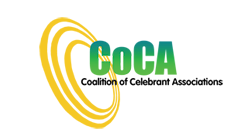GENERAL OUTLINE
The primary purpose of the Marriage Amendment Bill 2002 (‘the Bill’) is to give effect to the Government’s commitment to reform the Marriage Act 1961 (‘the Act’) as it relates to the Marriage Celebrants Program operated under subsection 39(2) of the Act. The Bill is the result of a four year consultative process.
The Marriage Celebrants Program was established in 1973 to provide marrying couples who did not want to have a religious ceremony with a dignified and meaningful alternative to a registry office wedding. When the program was launched, approximately one couple in six chose a civil marriage ceremony. Today, over half of all marriage ceremonies within Australia are non-religious ceremonies.
The vast bulk of these weddings are performed by civil marriage celebrants and the number of weddings they are performing is increasing each year as both religious and registry office weddings decline in number. The original program was designed to operate on a relatively small scale with limited numbers. There are now almost 1700 civil marriage celebrants and a similar number of religious marriage celebrants appointed under the program. Reform of the program to better cope with its rapid expansion is now necessary.
In relation to marriage celebrants currently appointed under section 39(2) of the Act, the principal provisions of the Bill have the following effect:
- introduction of a revised basis of appointment for new marriage celebrants based upon satisfaction of core competencies primarily by attendance at appropriate training courses and a detailed fit and proper person test;
- appointments remain on a lifetime basis, subject to regular reviews of performance;
- there is a transition period of 5 years to allow staged introduction of the revised basis of appointment;
- a statutory appointment as the Registrar of Marriage Celebrants is created with employment to come under the Public Service Act 1999;
- a public register of marriage celebrants is created that will be accessible from the internet;
- the standard of marriage celebrancy services is raised by introducing ongoing professional development requirements;
- power to create a more effective and transparent complaints handling mechanism is introduced;
- most refusals to register an applicant, revocation of authorisation or suspension of celebrants are subject to merits review by the Administrative Appeals Tribunal; and
- a legislated code of practice is introduced.
- the Notice of Intended Marriage is amended to make processes in relation to the form more flexible. In particular, notaries public will now be able to witness the Notice overseas. Currently only certain Australian qualified professionals and Australian Consular Officials are able to witness a Notice that is signed overseas. This process has a negative impact on overseas persons wishing to marry in Australia;
- overseas passports are an acceptable form of identification for couples as well as birth certificates;
- there is power in the regulations to provide guidance to authorities charged with permitting the shortening of time between when a Notice of Intended Marriage must be lodged and when a couple are able to marry;
- persons authorised to permit the shortening of time between when a Notice of Intended Marriage must be lodged and when a couple are able to marry no longer have to be justices of the peace or marriage celebrants; and
- Divisions 1 and 2 of Part V of the Act are removed. These divisions allow for marriages to be performed overseas essentially by Australia Consular Officials but have not been used since 1993.
REGULATION IMPACT ON BUSINESS
There will be some additional costs for marriage celebrants to undergo initial training and ongoing professional development. These costs are not expected to be great. Otherwise the regulation impact on business will be low. A Regulation Impact Statement follows.
REGULATION IMPACT STATEMENT
Background
However, since the Program commenced, the process for authorising civil marriage celebrants has developed in an ad hoc way.
In 1997, the current Government replaced the appointment by electorate system of authorisation with one based on regional or special community need. The needs based system has two aims: first, to ensure that marrying couples have a choice between civil marriage celebrants and second, to ensure the availability of celebrancy services to meet the special needs of particular groups, such as people from ethnic and cultural communities, or people with disabilities.
However, the current system remains far from perfect. Authorisation based on regional or special need excludes many people who would make excellent celebrants from entering the profession.
Furthermore, there is a perception that the current system does not encourage celebrants to convey fully the intention of the Marriage Act that marriage should be understood and appreciated as a solemn and binding union for life. Finally, both celebrants and marrying couples alike are concerned that not all celebrants provide services of an equally high standard.
"Option 3 - introduce the original reforms to the Program
Without the introduction of a conflict of interest criterion, there is no restriction on separating the interests of wedding organisers and celebrants. During consultations with interested parties, celebrants were vocal about the need for a conflict of interest provision, particularly in terms of having a stake in a wedding house or wedding organiser business."
“Option 4 – introduce revised reforms to the Program
Conclusion and Recommended Options
Option 4 is the preferred option.
Option 4 will revise the basis of appointment so that persons who meet certain skill requirements and statutorily defined fit and proper person criteria would be appointed notwithstanding the number of celebrants who might be in any given geographic area. Celebrants would be subject to ongoing scrutiny through 5 yearly review but would be appointed on a lifetime basis. These changes may lead to an increase in the number of celebrants, particularly over the longer term, as more training programs become available.
The revised system proposed in this option eliminates the ad hoc and subjective nature of the previous system of appointment and introduces a system of administrative law protection with greater transparency and accountability.
Implementation and Review
“Option 4 will be implemented progressively following the Government’s endorsement of legislative amendment. As a first step, the implementation of a revised basis of appointment for celebrants will occur through a transition period. For the next 5 years, appointments will be based upon satisfying core competency standards through the system of accreditation operating in vocational education and training. In addition, persons will have to satisfy the fit and proper person criteria to which will be added a criteria that celebrants must avoid a conflict of interest. “
“Wedding Oganisers
The introduction of formal training requirements proposed under the modified reforms will make it much more difficult for wedding organisers to capture the market. Celebrants will be unable to have an interest in other wedding related business as proposed by the conflict of interest reform.
On the other hand, these wedding organisers will have a wider range of appropriately experienced or qualified celebrants for referral to clients.
Wedding organisers may be able to provide an expert screening function for clients by ensuring they set high quality standards through referring clients to a choice of professional celebrants.
Wedding organisers, like their clients, should benefit from competition, as they will have a larger number of appropriately qualified celebrants to choose from.
This option has the potential to offer the wedding organiser an assurance that any complaint submitted by a marrying couple, will not reflect on the wedding”
“Consultation
The proposal to open the market to competition raised concern from celebrants. They argued that it would not resolve the inequitable spread of celebrants across Australia. It was perceived that increased competition would have a negative effect on standards of services and that it would make the service uneconomical for individual celebrants. There was also concern that a revised basis of appointment system would flood the market.
However, the Department does not expect there to be a flood of celebrants into the market because the conditions for appointment are being raised/increased. All potential celebrants would be required to undertake formal training and all celebrants, existing and new, would be required to undertake ongoing professional development. Some existing celebrants may choose to exit the market rather than complete the ongoing professional development requirements. This is expected to occur for some older celebrants and for those performing occasional services where the effort of maintaining their qualifications is likely to outweigh the income from providing the service. It is expected that these requirements would effectively keep numbers of applicants at an acceptable level.
Some existing celebrants objected to the requirement to undertake ongoing professional development for various reasons, including that there will be a cost attached, and some may consider retiring from the sector.
The Australian National Training Authority (ANTA) required the Community Services Training Package, developed by Community Services and Health Training Australia Ltd (CSHTA), to be reviewed by July 2001.
Amongst other things, the review process included a scoping study to identify any gaps in availability of units of competency and/or qualifications. Training for marriage celebrants was identified as a gap n this instance.”
“Concern was expressed about the proposal to establish a self-governing body for marriage celebrants, which would have responsibility for the authorisation and service of all celebrants. There was criticism that such a body may be too self-interested and also that the current arrangement whereby 13 separate associations purport to represent the sector, would make it difficult to self-regulate with any degree of consistency and confidence.
The revised proposal has taken account of the preference for the Attorney-General’s Department, or other Government body, to retain overall control of standards. It is considered that it would be in the best interests of the sector to postpone self-regulation until such time as a stable, widely accepted, national representative body provides a ready basis for national regulation. The revised proposal would incorporate the appointment of a Registrar of Celebrants within the Attorney-General’s Department who would make appointments of celebrants on the basis of satisfactory training and meeting the statutorily defined fit and proper person criteria.
The final proposal attracting criticism was the introduction of a processing and/or registration fee.
Concerns were expressed that any such fee would be passed to the consumer, that some celebrants officiate at lower numbers of weddings, and that many country based celebrants charge less for weddings that their city counterparts.
Taking account of these concerns resulted in a further option concerning fees which was that celebrants pay an annual fee for authorisation using a sliding scale based upon the number of weddings performed.
In order to ensure that celebrants were not disadvantaged by the impost of fees, it was proposed that the Registrar of Celebrants would have the power to waive the fee in cases of demonstrated hardship.
The Bill does not include provision for celebrants to pay an annual fee for authorisation. After careful consideration it was concluded that the cost to authorised celebrants and the resulting cost to marrying couples of such a fee as well as the administrative cost to collect the fee outweigh any advantages of a fee.”
FINANCIAL IMPACT STATEMENT
The additional regulatory functions to be carried out by the Attorney-General’s Department will involve greater administrative costs. The additional cost is estimated at approximately $320,000 per annum. There will be additional funding provided to the Attorney-General’s Department to meet these costs.
REGULATION IMPACT ON BUSINESS
There will be some additional costs for marriage celebrants to undergo initial training and ongoing professional development. These costs are not expected to be great. Otherwise the regulation impact on business will be low. A Regulation Impact Statement follows.


